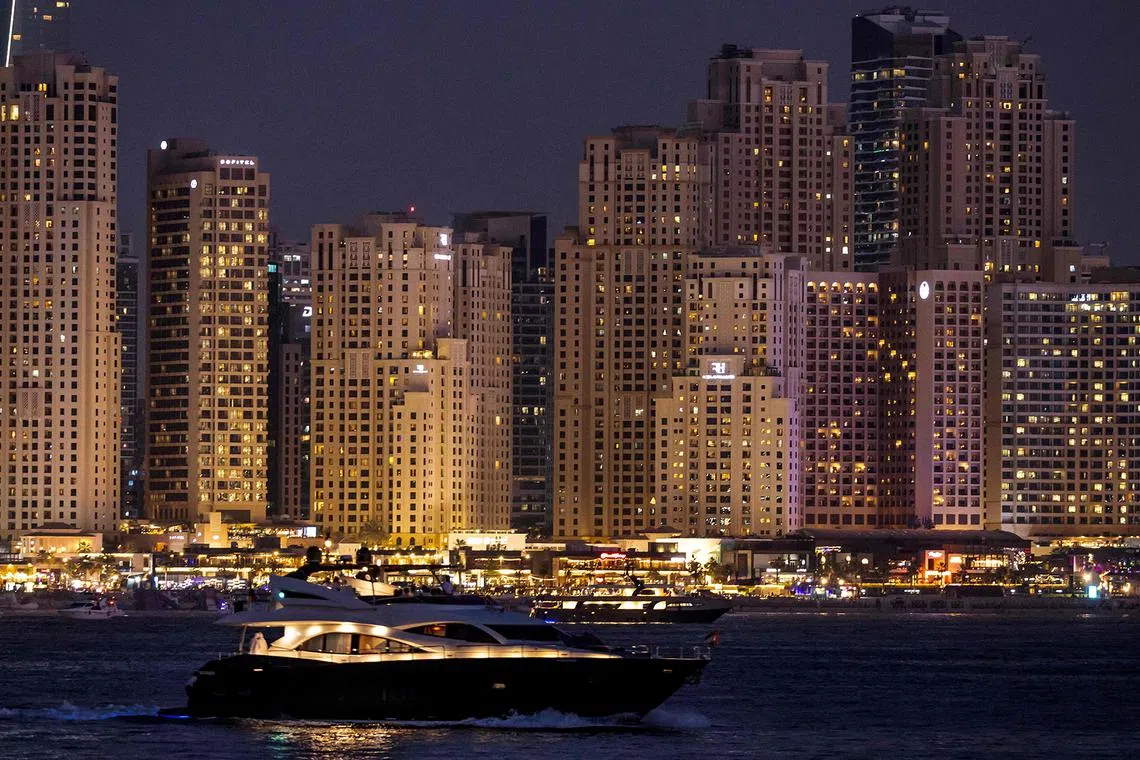Viewpoint: An EV revolution is happening in the heart of Opec
Sign up now: Get ST's newsletters delivered to your inbox

Drivers in Dubai are starting to pick electric vehicles over petrol-powered cars.
PHOTO: AFP
UNITED ARAB EMIRATES – Think of the most important markets for electric vehicles (EVs) and you will have a list of the usual suspects: Norway, China, Germany, the United Kingdom. But Dubai?
It seems improbable, but the second-biggest exporter in the Organisation of Petroleum Exporting Countries (Opec) deserves a place alongside those other markets.
Fully electric vehicles comprised 10 per cent of the value of cars imported into the United Arab Emirates (UAE) in 2024, according to trade data. Throw in hybrids and plug-in hybrids, and more than a quarter of the market is switching to batteries.
That is a troubling sign for the UAE and its oil-exporting neighbours in the Persian Gulf. If nations that owe their very existence to the transformative power of crude are switching to lithium-ion, then the prospects for their key export are looking distinctly shaky.
The UAE is, to be sure, an outlier. But it is not completely alone.
In Qatar, one in eight vehicles imported in 2024 was battery-powered or hybrid, with similar proportions in Iraq and Iran. The share was 10 per cent in Bahrain and 7 per cent in Kuwait.
EVs are springing up everywhere across the region. About 35,000 were registered in the UAE as of October 2024, according to government data.
Tesla has stores in four of the UAE’s emirates as well as Qatar, and in April, it announced a division in Saudi Arabia. It is playing catch-up with China’s BYD, already in all of those markets plus the other three Gulf monarchies.
Saudi Arabia’s relative paucity of imports belies its ambitions as a manufacturer. The kingdom’s Public Investment Fund (PIF) has poured more than US$8 billion (S$10.3 billion) into its majority-owned Lucid Group, a US-headquartered EV-maker.
Lucid has built an EV plant in King Abdullah Economic City on the shores of the Red Sea that aims to churn out 150,000 cars a year, though sales so far have not come close to such ambitious projections.
Nearby, a joint venture between the PIF and Hon Hai Precision Industry, or Foxconn, is building another US$1.3 billion EV plant, while a third joint venture between PIF and Hyundai Motor broke ground in May 2025 with plans to manufacture both EVs and conventional cars.
This budding love affair with EVs might not be quite as surprising as it first seems.
Two of the biggest barriers towards switching to electric are range anxiety and upfront costs, but neither applies much in the monarchies of the Gulf Cooperation Council. They are some of the most urbanised societies on the planet, so outside of Saudi Arabia, few people are driving great distances.
High disposable incomes make it easy to pay for a battery car, especially as cheaper Chinese models flood the market.
Lacking domestic vehicle industries to protect, they are less likely to raise tariffs like the US and Europe have done. Low-density suburbs give plenty of opportunities for owners to charge cheaply at home.
The heavily subsidised petrol that the world’s petrostates give to their citizens is not nearly the deterrent you might expect either.
Most of the Gulf countries have made attempts to link their fuel prices to market rates over the past decade, discouraging the extreme wastefulness of domestic consumption and freeing up more crude for export.
While petrol is still absurdly cheap by global standards, electricity now receives far more generous subsidies as governments attempt to stimulate industrial activities that can carry their economies through the looming downturn in oil demand.
That translates into rock-bottom charging costs for owners.
“Electricity is so cheap here that you won’t even notice the difference on your bill,” one Dubai-based owner of an Xpeng car wrote in a social media post in May.
An owner of a BYD Qin estimated savings of 36,000 dirhams (S$12,600) over five years due to paying “basically nothing” for electricity.
It might be tempting to think of the burgeoning Gulf EV market as an idiosyncratic case. That would be a mistake.
The popularity of battery propulsion in a region built on the thirst of internal combustion engines is a warning that a fundamentally better technology is now displacing petrol for good.
With oil prices gyrating after the Israeli attack on Iran on June 12
The world’s refiners are already gearing up for an imminent future where chemicals consume more petroleum than petrol-powered vehicles.
In decades to come, oil monarchies will not pay their bills by providing the fuel for your car, but feedstock for the plastics in its dashboard and seat foam.
Road fuel still consumes more than half of the world’s oil. Judging by the electrification of crude’s heartlands, decline is now imminent. BLOOMBERG
David Fickling is a Bloomberg Opinion columnist covering climate change and energy.


